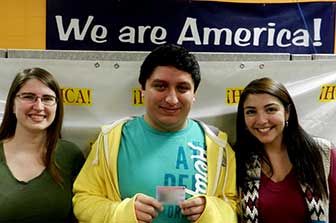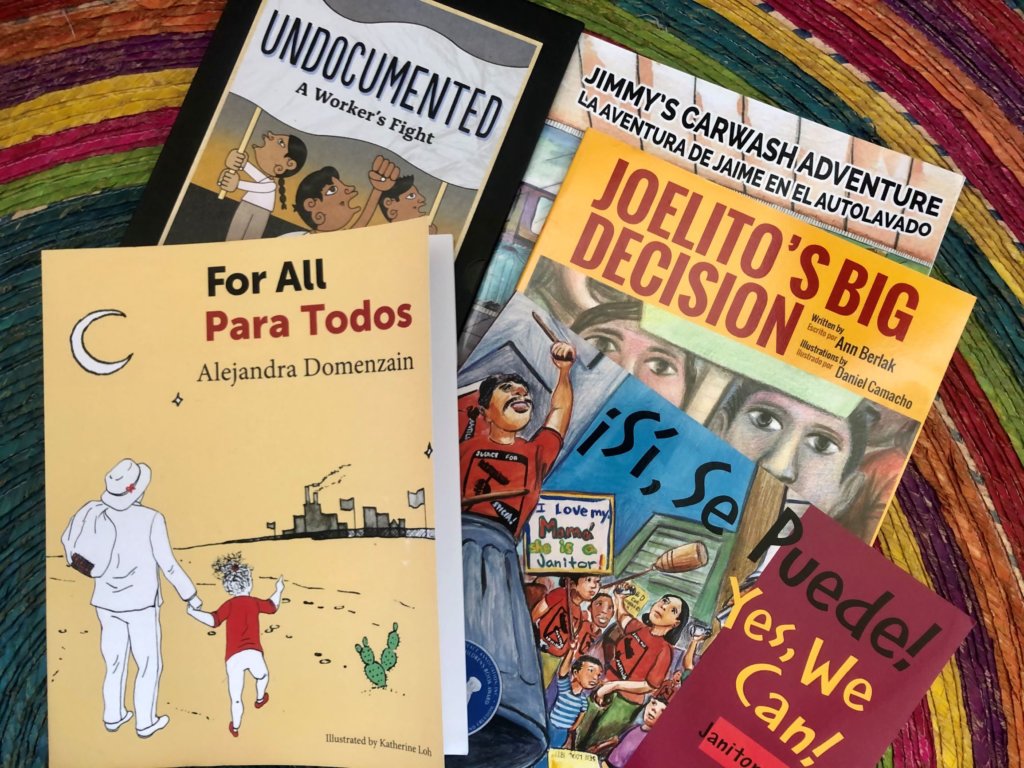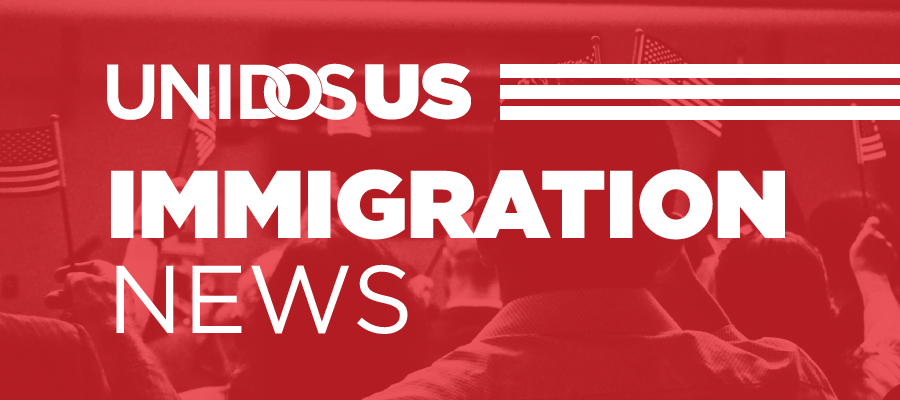Two Líderes Avanzando Fellows Explore the Benefits of Providing Financial Aid to Undocumented College Students
Year after year, hundreds of thousands of Latinx and first-generation college students head off to institutions of higher education with the goal of attaining a degree that can improve their chances of economic prosperity and increased engagement in American society.
According to UnidosUS’s recent report A Path Forward for Latinos: Laying the Groundwork for Equity in Higher Education, Latinos will make up 30% of the nation’s workforce by 2050, and they will require some type of degree or credential to contribute to efforts to rebuild the economy after the pandemic.
Over the last few months, two college students enrolled in UnidosUS’s Líderes Avanzando Fellowship Program have been exploring the barriers undocumented students face in getting that education. Fellows Amy Morales and Katherine Trejo each built commentaries from the testimonies of their undocumented peers.
An Undocumented Friend’s Struggle to Pay for College Made Me Think About Tens of Thousands of Others with Similar Stories
By Amy Morales, Florida State University, Political Science
I met Liz in high school. I remember us talking about our plans- what colleges we had applied to and where we saw each other in the future. When Liz wasn’t studying for an AP exam or staying after school for yearbook, she was competing in soccer matches and coaching young girls. She dreamt of playing on Division 1 soccer team, the most competitive level of the National Collegiate Athletic Association (NCAA) while majoring in photojournalism. But in her senior year, when the time came to commit to colleges, Liz’s only choice was to live at home in Miami and attend Miami Dade College. The colleges and universities she intended to play for had no grant or scholarship system set up for undocumented students like her, and tuition at those institutions averaged $50,000 a year.
Liz’s story is not unique. There are many stories of undocumented students who are deterred from pursuing college because of the high cost of tuition. Paying out of pocket for tuition and books means taking an extra job which then reduces the hours one can dedicate to school work. Juggling multiple jobs and the added stressor of being undocumented in the United States means facing both fronts of economic and social marginalization.
The College Board estimates that 65,000 students who are undocumented graduate each year from U.S. high schools. And according to the 2015 data from the U.S. Department of Education, only about 5% to 10% of undocumented students pursue higher education, and far fewer graduate with a degree. That’s in large part because of the very same challenges Liz faces. About 24.5% of undocumented students live below the poverty threshold. This, coupled with limited access to higher education, makes it close to impossible for them to imagine a scenario in which they aren’t living paycheck to paycheck, according to Center for Migration Studies.
Undocumented students must scramble to figure out how to pay for each semester when the semester is already upon them, sometimes, taking fewer classes to reduce the tuition cost for the whole year. In order to graduate within a four-year period, most students have to take on a full load, which is about four to five classes per semester.
Liz chose to start at Miami Dade Community College, and since she came in as an honors student, she was given a $1,200 stipend per semester. That money would normally go to textbooks and outside class expenses, but she put the money directly into her savings account. Without a savings, Liz couldn’t transfer to university, and her dreams of playing soccer while studying for a degree in journalism would have been futile.
She successfully made the transition to Florida International University in 2019, but she can only take a few classes per semester. For example, this spring, she used her soccer coaching money to pay $2,236 for three classes. She would be able to graduate and move onto her career faster if she took two more, but that would cost her an additional $1,490 per semester, which would eliminate basic expenses like food and rent. As it stands, she only has $100 per month left over to contribute to her family’s household expenses.
“There’s so many of us in school right now with no financial help, who don’t qualify for DACA. What can we do? There is no financial stability for us.” Liz told me in one of our conversations for this blog.
Even her athletic prowess isn’t enough to level a workforce playing field—American society never designed with the undocumented in mind.
Students like Liz often arrive in the United States as young as infants, attend school, learn the language, and come to adopt the culture as their own, because it is.
“My whole life is here, my friends and family. I have established roots here,” Liz told me.
Liz deserves to live a joyous, creative life one unburdened by the cost of higher education in which she can build a life for herself and her family.
Amending the HEA to authorize Deferred Action for Childhood Arrivals (DACA) recipients, Temporary Protected Status (TPS) holders, and undocumented students to be eligible to apply for federal student aid would make a world of difference to students like her, not to mention for the whole of society.
Georgetown University’s Center on Education and the Workforce and the Bureau of Labor Statistics estimates that 65% of jobs will require a college degree. With access to FAFSA, undocumented students would enroll in and graduate from institutions of higher education at much higher rates. That would help them secure better jobs, a more stable financial future, and make significant contributions to just about every aspect of American life.
Whether she’s coaching youth soccer or fulfilling her dream of one day shooting photos for National Geographic, she is a student who helps to develop and reflect the fabric of our society.
Asked what message she would most like to portray to readers of this blog, she said:
”Remember to acknowledge us, acknowledging us means verifying all of my efforts in school were not for nothing, that all of my work supporting my family means something.”
If you’d like to support Liz’s work here are some links:
https://liznicoleg17.wixsite.com/lifephotography
https://egarc352.wordpress.com/
https://elizabethg17.blogspot.com/

We’d All Benefit if Congress Made Title IV Funds Available to Undocumented College Students
By Katherine Trejo, George Mason University, B.A., Conflict Analysis and Resolution
Since the coronavirus pandemic hit the United States., there has been a 6% reduction in Latinx post-secondary program enrollment, according to a report by UnidosUS. Another report by the National Education Association and the Presidents’ Alliance on Higher Education and Immigration, tells us that about 46% of all undocumented college-aged students are Latinx.
Among them is Rachel, a junior at George Mason University. As a DACA recipient and undergraduate student, she has struggled financially to pay for tuition, books, and transportation. She currently works as a front desk attendant at the GMU Card Office, and the pandemic has taken a particularly heavy toll on her financial, mental, and emotional health as her weekly hours were reduced from 15 to three. A couple of months ago, she was also in a car accident that left her without her own transportation to get to and from school and work.
As with Rachel, COVID-19 has exacerbated the larger barriers undocumented students face to continue their studies. Many of them are also essential workers with little legal protection from COVID-19 out of fear of being detained or harassed by ICE officials.
It’s not news that the pandemic has disrupted life as we know it. For many, COVID-19 has exploited and exacerbated the pre-existing conditions of our society that promote inequality and oppression. Many have lost their jobs, their homes, and their lives. The undocumented community is one of the disadvantaged communities that the pandemic is disproportionately affecting.
In an effort to make higher education more affordable to undocumented students, Congress should make all Title IV funds, available to them. Title IV funds include Direct Subsidized/Unsubsidized Loan, Direct Graduate PLUS Loan, Direct PLUS Loan, Federal Pell Grant, Federal Supplemental Educational Opportunity Grant (SEOG), Federal Perkins Loan, and TEACH grants that documented citizens are eligible for within their financial aid. This would alleviate mental and financial stress on these students and their families who are battling the pandemic. In the state of Virginia State Senator Jennifer Boysko introduced SB 1387 to allow undocumented students, who now qualify for in-state tuition, to be eligible for state financial assistance programs like other students who receive in-state tuition benefits.
We should all take a few pointers from State Senator Boysko and commit to financial relief for undocumented students and their studies as they are a crucial contributor to the nation’s progress both economically and societally.




